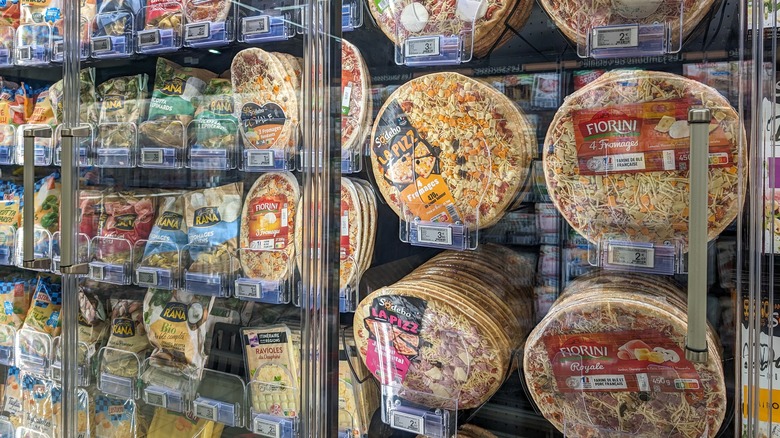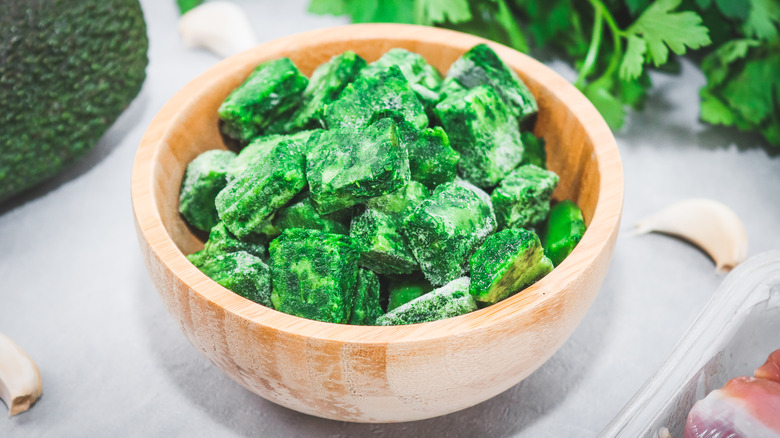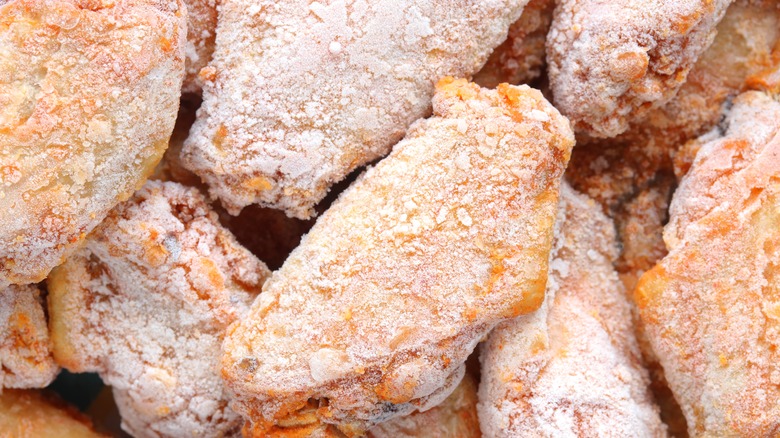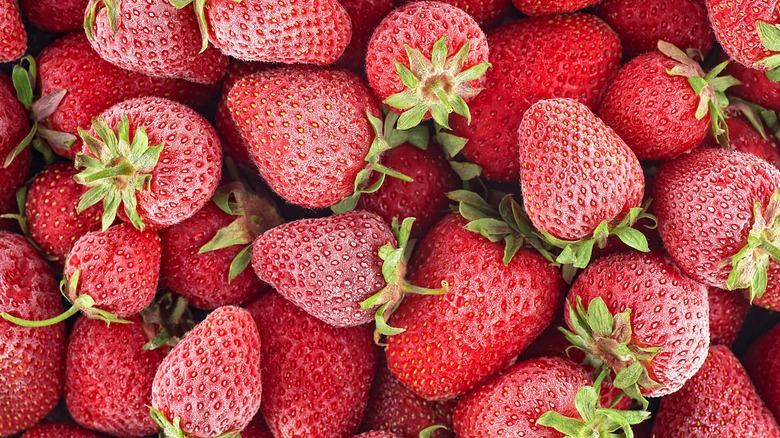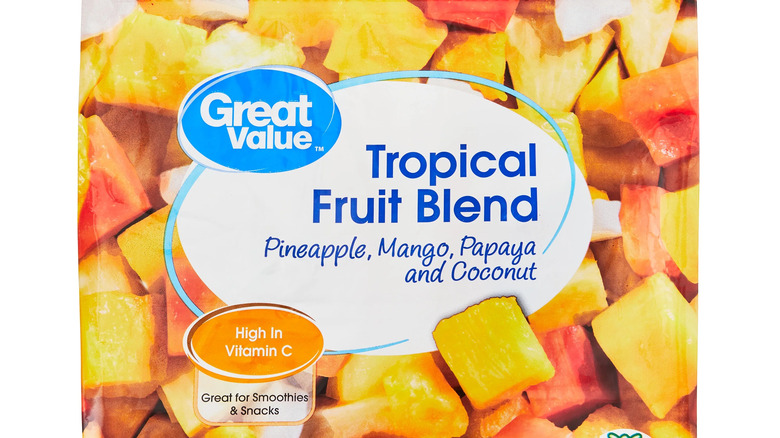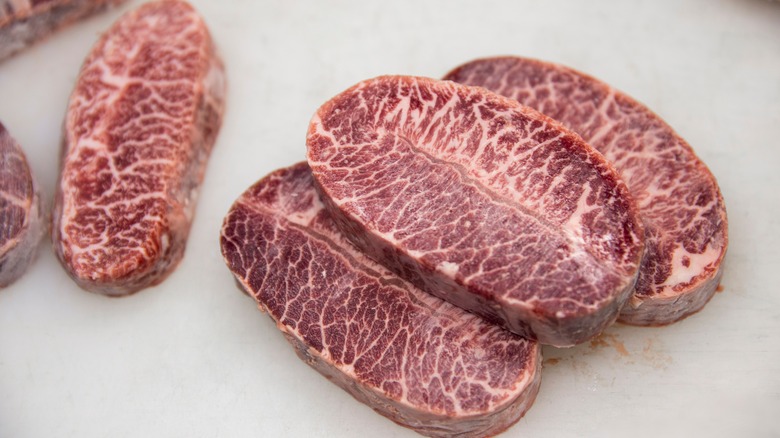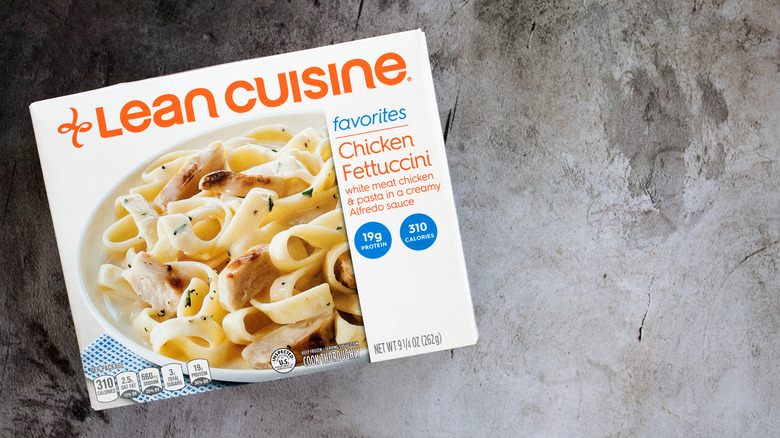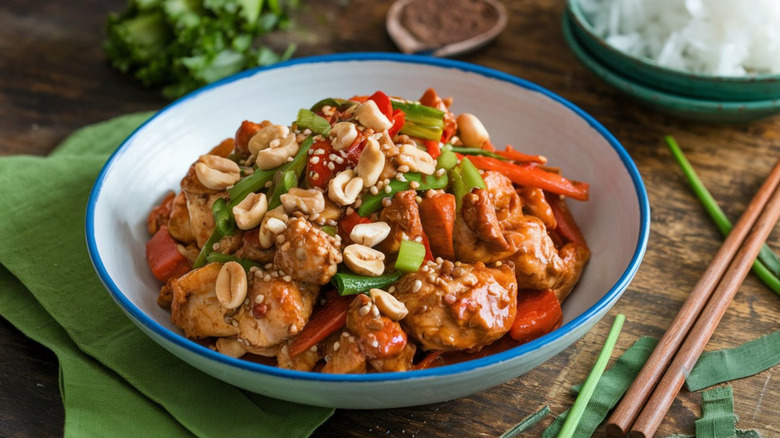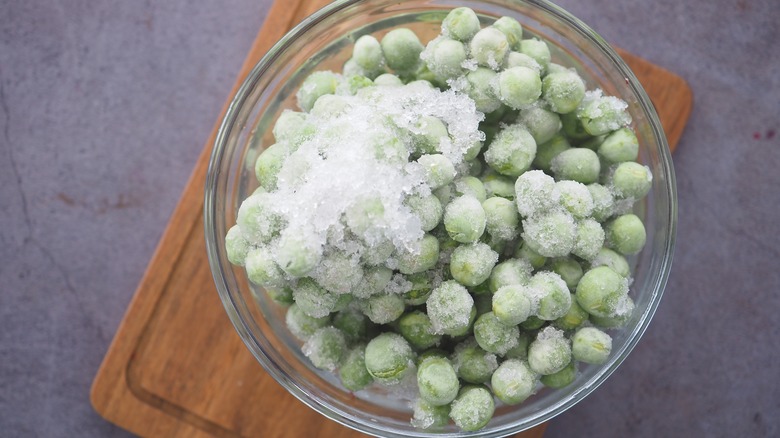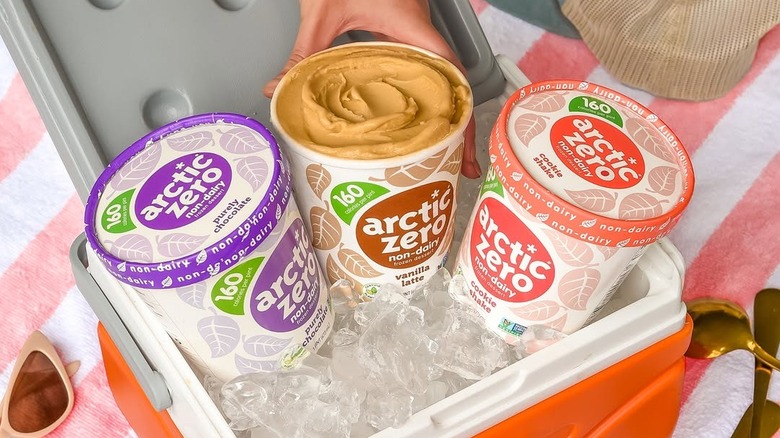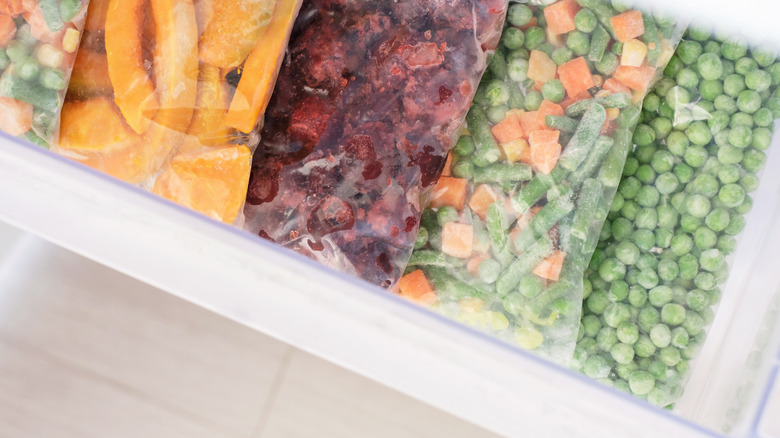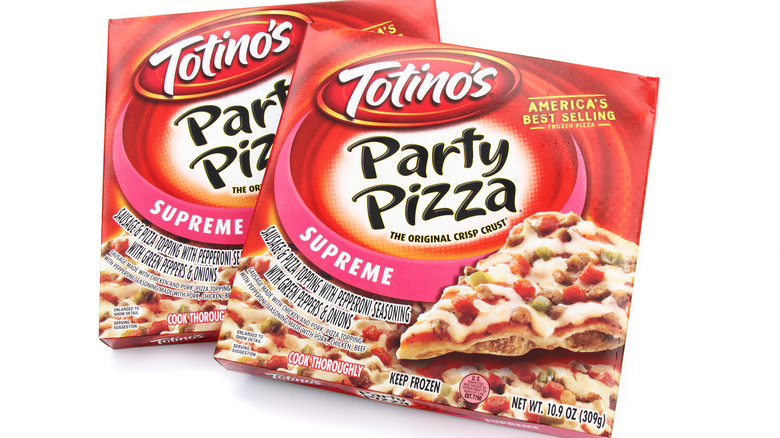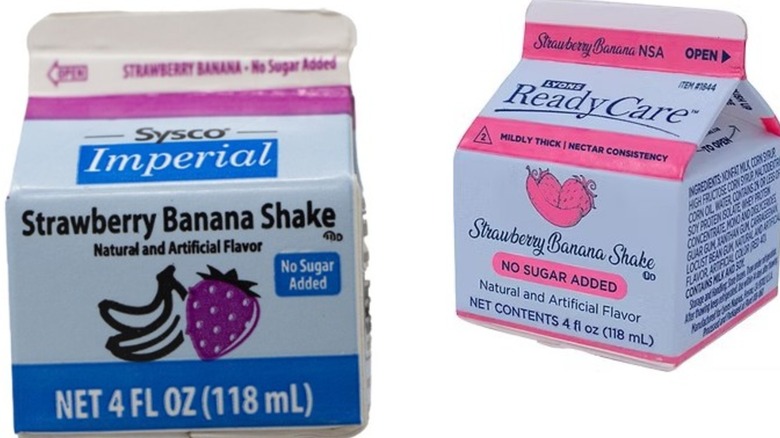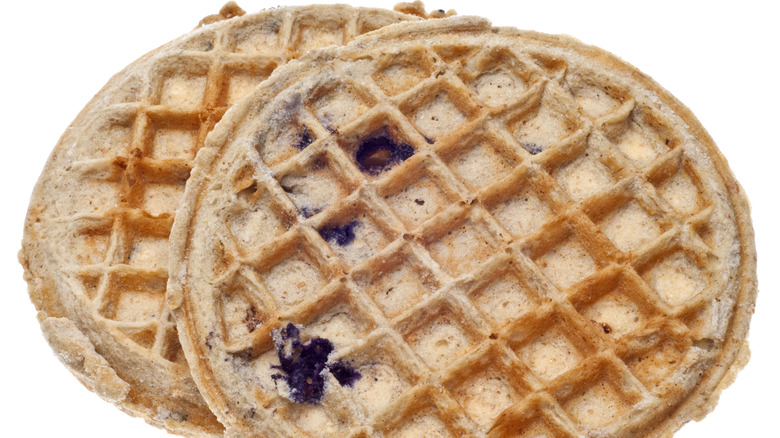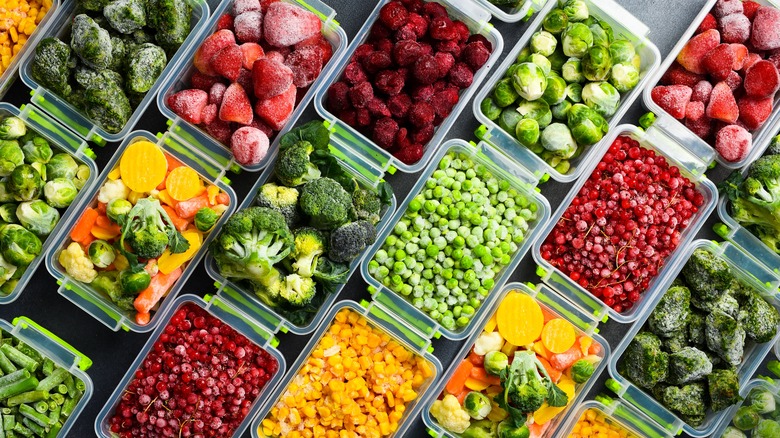16 Biggest Frozen Food Recalls To Sweep The US
If you can get past the high saturated fat, sodium, and sugar counts, frozen meals are a pretty great deal. For one, frozen foods bypass the need for a lot of the preservatives you'll find on most ready‑to‑eat grocery store foods. Quite a number of frozen foods also come pre‑cooked or partially cooked, so all you have to do is thaw and heat them up before you get to eating; they are pretty convenient for those days when you just can't summon the wherewithal to make something from scratch.
But while the frozen food industry over the years has done a lot for civilization, it's not been completely unmarred by recalls. From contamination with harmful bacteria such as Listeria, E. coli, and Salmonella, to viruses like hepatitis A, and even foreign objects like plastic and glass, frozen foods — like practically every food you'll find on grocery store shelves — have been at the center of some pretty massive recalls over the years. Here's a roundup of some of the worst.
Coastal Green Vegetable Company (2015)
Stocking up on frozen spinach is always a great idea. It's packed with iron, fiber, and essential vitamins, takes up way less room in your fridge than fresh, and plays well with just about any soup. It seems like a pretty hard-to-beat deal, unless, of course, it's contaminated with Listeria. In March 2015, California-based Coastal Green Vegetable Company recalled a whopping 502,000 pounds of frozen IQF organic spinach after it was found to be potentially tainted with Listeria.
A crescendo of recalls followed shortly thereafter. By the time April rolled around, multiple companies had issued recalls for products made with the tainted Coastal Green frozen spinach. Among the first to join was Twin City Foods, which recalled four varieties of spinach sold at Meijer and Wegmans grocery stores. Next was California-based Amy's Kitchen, which recalled nearly a dozen categories of products containing the tainted organic spinach. Then came California-based La Terra Fina, which pulled two categories of dip from Costco and Smart & Final grocery stores nationwide. California-based Superior Foods pulled 8,475 cases of frozen spinach from Target outlets nationwide. Wegmans and Carmel Food Group also issued product recalls involving the spinach.
Pilgrim's Pride Corporation (2009)
Buying pre-made chicken wings is always a gamble. For one, quality varies wildly from brand to brand, so you're not likely to get the same crispy, perfectly seasoned result you'd get if you just made a batch from scratch. And with frozen chicken being such a frequent flyer on the recall list, there's also a marginal chance you'll end up returning the wings to the store before they've even had the chance to disappoint you.
That marginal chance became more or less a foregone conclusion for shoppers who bought fully cooked Buffalo-style chicken wings in June 2009 from the now-struggling supermarket chain Kroger. As it turned out, Pilgrim's Pride Corporation — the Texas-based supplier behind the pre-made chicken wings — hadn't declared known allergens wheat, milk, and soy on the product packaging. As a result, 608,188 pounds of frozen wings had to be pulled from Kroger stores across the nation.
California Splendor (2023)
Costco's frozen food section is a great place to score unbeatable bargains. Take Kirkland Signature Organic Frozen Strawberries, for instance. Retailing at around $10.99 for a 4-pound bag, they're already pretty irresistible even before you get to the part where you get to keep them in your freezer for ages. But even strawberries can be the source of contamination. Frozen organic strawberries sold at Costco and other retailers were involved in recalls in 2023 from several companies that received berries potentially contaminated by hepatitis A from a single supplier.
A major recall was initiated by Oregon-based Scenic Fruit Company on March 17, 2023, and spanned over 300,000 pounds of frozen organic strawberries and frozen organic tropical fruit blend sold not only at Costco but also at Aldi and Trader Joe's. Another was initiated by San Diego-based California Splendor just a day prior and involved 659,504 pounds of Kirkland Signature Organic Frozen Strawberries sold at Costco outlets in Hawaii, Los Angeles, and San Diego. Other companies that issued recalls linked to the hepatitis A contamination were Willamette Valley Fruit, Wawona Frozen Foods, and Meijer stores. Ten people across California, Hawaii, Washington, and Oregon were sickened with four of them requiring hospitalization.
Port City Bakery (2020)
The world's your oyster when you've got a frozen pizza crust and an avid imagination. You could slather your frozen crust in butter, add on a few marinated vegetables, give yourself an extra dosing of marinara, or even toss a controversial fruit like pineapple on top. Just be careful not to get too lost in your reverie and accidently toss in random objects like glass fragments because then nobody's eating your pizza, pineapple topping or no.
And if that sounds too absurd to happen in real life, just consider Wisconsin-based Port City Bakery, which had to recall 562,812 units of par-baked frozen pizza crusts sold across Illinois and Wisconsin over possible glass contamination. Obviously, the risk potential here was far greater than a whimsical kitchen mishap. Depending on the size of the contaminants, ingesting glass fragments could cause lacerations to the stomach lining, leading to anything from mild internal bleeding or infection to full-blown ulceration or intestinal perforation. No known injuries were reported.
Townsend Farms (2023)
In an ideal world, food recalls would be isolated incidents, limited to just one product line and confined to a single company. But the food industry supply chain being what it is, a single recall can crescendo across the sector, triggering a domino effect where products get pulled from shelves in mind-blurring succession.
That's about the stretch of what happened in late June 2023, when SunOpta Inc. doing business as Sunrise Growers Inc. issued a nationwide recall for an unspecified amount of frozen fruit mixes sold under multiple brands — including Trader Joe's Organic, Great Value, Good & Gather, and Best Choice — over potential Listeria contamination introduced by an unnamed third-party supplier.
Barely a week later, the recall spilled over to New Jersey-based Townsend Farms Inc., which had used mango chunks sourced from SunOpta to make four categories of Private Selection brand fruit mixes. With SunOpta fruit mixes under recall, Townsend Farms was forced to pull a whopping 667,210 pounds of its fruit mixes from Kroger stores across multiple states, including Kentucky, Virginia, Texas, Missouri, Ohio, and South Carolina.
Stampede Meat (2003)
Frozen beef might provide some conveniences, but as any professional chef will tell you, you're better off sticking with fresh ... unless you're partial to steak that's par-cooked, bland, and dry. And with meat products being so prone to contamination, sometimes there's a lot more on the line than ending up with a cardboard-esque steak. That could include a bad case of food poisoning, like the four Minnesota residents sickened with E. coli after eating beef distributed by door-to-door salespeople between May and June 2003.
State health officials linked the tainted beef to Illinois-based Stampede Meat Inc., which then voluntarily recalled 739,000 pounds of mostly frozen steaks from restaurants, retailers, and institutions across the U.S. and Canada. In a statement, health officials at the time said they believed that those who had fallen ill likely ate steaks that were not fully cooked, which adds up, given how unevenly frozen beef tends to cook.
Nestlé Prepared Foods Company (2008)
Given plastic's overwhelming abundance in the environment, it shouldn't come as a surprise that its presence — like foodborne pathogens such as Salmonella and Listeria — is also a frequent reason for food recalls. Reports of plastic pieces in food prompted separate recalls in 2023 for Johnsonville sausage links and ConAgra Brands chicken strip frozen dinners. Adding to the tally of foods wiped off grocery store shelves due to plastic contamination were Lean Cuisine brand frozen chicken meals, which were processed by Utah-based Nestlé Prepared Foods Company and recalled in November 2008.
One unfortunate customer reported sustaining an injury while eating the frozen Lean Cuisine meal, triggering an investigation that uncovered small bits of hard blue plastic. Federal officials also reported receiving other consumer complaints about the plastic contamination. As a result, 879,565 pounds of food were pulled from circulation. This was the third recall of frozen foods that year for Nestlé Prepared Foods Company, which also removed 415,077 pounds of Lean Pockets and Hot Pockets in July and August of 2008 due to plastic contamination from the same source.
The Hain Celestial Group (2009)
The food industry has been marred by many a scandal over the years, but none can quite match the scope and mayhem that resulted from the Peanut Butter Corporation of America's peanut product contamination in 2008 and 2009. Decades of skirting food safety regulations came crashing down on PCA, resulting in a recall so massive it spanned 46 states, more than 3,900 products, and spiraled into a chapter seven bankruptcy filing, dozens of lawsuits, and criminal prosecutions for a handful of people deemed responsible.
Caught in the crossfire were more than 360 companies, one of which was The Hain Celestial Group, which found itself recalling 983,700 pounds of frozen Ethnic Gourmet Chicken Pad Thai and Trader Ming's Spicy Kung Pao Chicken made with potentially Salmonella-tainted PCA peanut products. Multiple household names were implicated in the recall, including Trader Joe's, Trader Ming's, Gluten Free Café, and Ethnic Gourmet. While no cases of food poisoning were linked to Hain Celestial products, PCA's recall was linked to 714 cases of salmonellosis (with nearly a quarter of them requiring hospitalization) and nine deaths.
Pinnacle Foods Group (2006)
Not too long ago, food companies had free rein on what they could put in food. From coal tar as a coloring agent and formaldehyde as a preservative to undisclosed allergens, it was basically a free-for-all. The legal landscape has changed quite a lot in the past couple decades. Not only are there stricter regulations on what companies can add to your food, there are also enforceable legal mandates on declaring known allergens on product packaging.
Omitting allergy information from product packaging can now send products flying off the shelves in a flash, like it did in January 2006 when New Jersey-based Pinnacle Foods Group Inc. found itself pulling a startling 1,010,118 pounds of Aunt Jemima brand frozen waffles and frozen French toast from retail stores across the country due to undeclared egg. No illnesses were reported in connection to the recall. That's good news, considering people with egg allergies can develop potentially life-threatening complications, sometimes within minutes of ingesting eggs.
Lakeside Foods (2017)
Frozen peas: They're sweeter, less likely to mush up in a soup, and no-fuss since they come pre-washed and pre-shelled. Really, even celebrity chef Bobby Flay prefers frozen peas over fresh ones. But like every other frozen food out there, frozen peas are not immune to Listeria. Unlike more fragile bugs like Campylobacter or Shigella, Listeria may still remain even after a food is frozen. It's even capable of multiplying under industrial-grade freezing, which is a feat considering a standard commercial freezer can hover at or below minus 10 degrees Fahrenheit.
Even giving your peas a power wash after thawing might not help. The potential risk for having frozen peas tainted with such an aggressive bacteria is pretty up there, which is why Wisconsin-based Lakeside Foods Inc. had to recall 1,339,392 pounds of Season's Choice and Aldi brand frozen sweet peas from Aldi outlets across multiple states — including Iowa, Ohio, Illinois, Kentucky, and Florida — after retail-point testing by Florida health officials revealed Listeria contamination.
Arctic Zero (2012)
Food poisoning agents like Salmonella and Listeria might rule the roost when it comes to recalls, but there's another dark horse constantly nipping at their heels: undeclared allergens. Recalls triggered by undeclared allergens have swept countless frozen foods off retail shelves over the years; though few can hope to hold a candle to the Arctic Zero recall of 2012, which wiped 2,303,112 frozen dessert products in pints and bars from Publix, Independent Natural, Whole Foods, Winn-Dixie, and Sprouts stores across the country.
The Food Allergen Labeling and Consumer Protection Act (FALCPA) of 2004 mandates clear labeling of all products containing known allergens like milk, eggs, nuts, soy, and shellfish. A recall becomes inevitable when said ingredients are omitted from labels, either due to mislabeling, packaging mix-ups, or cross-contamination during processing. In this case, the culprit was a labeling error, wherein nearly a dozen products containing whey protein — a known derivative of dairy — were not labeled as containing milk.
National Frozen Foods Corporation (2016)
Like Salmonella, Listeria really gets around in the food industry, felling everything from bagged greens to Dunkin' baked goods to cheeseburgers. In June 2016, its presence was detected in products from Seattle-based National Frozen Foods Corporation, a major supplier for retail giants like Walmart, Target, Smart & Final, and Reinhart Foodservice. Multiple batches of frozen peas and vegetables sold under household names like Bountiful Harvest, Live Smart, Great Value, and C&W were affected.
U.S. shoppers weren't the only ones who took a hit. Bulk shipments of the products had also been sent to retailers across Canada and Japan, which meant that National Frozen Foods Corporation had to issue a massive international recall for a whopping 4,743,283 pounds of products potentially tainted with Listeria. Fortunately, no illnesses were reported, a near miss considering Listeria can cause severe complications or even death in the elderly, children, and people with weakened immunity.
General Mills Operations (2007)
Beyond making one of the most atrocious frozen pizzas you'll ever buy, Totino's got a pretty massive stain on its food safety record, having been caught up in one of the biggest frozen pizza recalls in history. Things started going south in November 2007, when investigators traced a multistate E. coli outbreak dating back to July of that year to Totino's and Jeno's brand pepperoni pizzas produced at General Mills' Ohio plant.
Of the 21 people sickened by the outbreak, eight were hospitalized, and four developed a rare but serious form of kidney failure caused by E. coli. In a public statement, General Mills officials claimed at the time the company had found no traces of E. coli in either the products or at the Ohio facility where they were produced and suspected the contamination was in the pepperoni obtained from an outside supplier. But with nine of the 21 sickened individuals reporting they'd eaten Totino's or Jeno's pepperoni pizza before falling ill, the company eventually pulled nearly 5 million frozen pizzas from retail stores across the country.
Lyons Magnus (2025)
Federal investigations have been pretty utilitarian in the battle against foodborne illnesses such as Listeria, Salmonella, and hepatitis A. Usually, it takes investigators time to round up enough evidence to issue a recall. But sometimes, an outbreak can run rampant for months — or even years — before the source is identified.
One of the most egregious examples of this was traced back to 2018, when residents of long-term care facilities across multiple states began falling ill with listeriosis. Ensuing investigations dragged on for nearly half a decade without pinpointing the exact source of the outbreaks, even as hospitalizations and the death toll rose.
The investigation remained stalled until October 2024, when the Centers for Disease Control and Prevention finally connected six illnesses to batches of Lyons ReadyCare and Sysco Imperial brand frozen supplemental shakes. The flavored drinks were distributed by Lyons Magnus and sourced from Prairie Farms Dairy, which is where the contamination originated. As a result, a nationwide recall of 9,540,625 pounds of tainted frozen shakes was initiated in February 2025, putting an end to a Listeria outbreak that was linked to the hospitalizations of more than 40 people and 14 deaths across 21 states.
Treehouse Foods (2024)
There are not a lot of rules when it comes to preparing store-bought frozen waffles. You can even bypass the toaster altogether if you prefer an air-fryer crisp result instead. But even those heating methods might not be enough to eliminate Listeria, a freeze-resistant bacteria.
And if you're wondering just how much at risk you are when buying listeria-tainted frozen waffles, just ask Illinois-based Treehouse Foods Inc. In October 2024 the company was forced to recall 9,907,389 cases of frozen waffle, Belgian waffle, and pancake products spanning multiple brands — including H-E-B, Kroger, Good & Gather, Signature Select, Krusteaz, Great Value, 365 Organic, Wegmans, and Breakfast Best — after they were found to be potentially tainted with Listeria.
This recall spanned all states and provinces across the U.S. and Canada. Fortunately, no illnesses or hospitalizations were reported, partly thanks to early detection of the contaminant during routing testing by the manufacturer.
CRF Frozen Foods (2016)
Taking the cake for the biggest frozen food recall of the last decade is Washington-based CRF Frozen Foods. In April 2016 the company pulled a staggering 164,288,373 pounds of frozen fruit and vegetables spanning hundreds of household names — including Overhill Farms, Veggie Maria, Life Foods, Emerald Farms, Great Value, Kirkland Signature, Wild Oats, and Woolworths — from retailers across the U.S. and Canada after retail-point testing by the Ohio Department of Agriculture uncovered Listeria in lots of True Goodness by Meijer frozen organic white sweet cut corn and frozen organic petite green peas.
You'd think a recall involving more than 500 products sold under that many household names would be the end of it. It wasn't. Days after the recall was announced, Oregon-based Ajinomoto Windsor Inc. pulled 47,112,256 pounds of not-ready-to-eat meat and poultry products of its own from retail shelves across the U.S., Canada, and Mexico that were made with CRF's tainted frozen vegetables. Nine people in four states were hospitalized with Listeriosis, and three of them died.
Following the recall, CRF voluntarily suspended operations at its Pasco, Washington, plant, a move well past its due date. Per Food Safety News, CRF had been playing fast and loose with safety standards for years, with inspections dating back to 2014 that uncovered a slew of violations and more than one customer reporting they had found rodents in CRF frozen vegetable bags.

